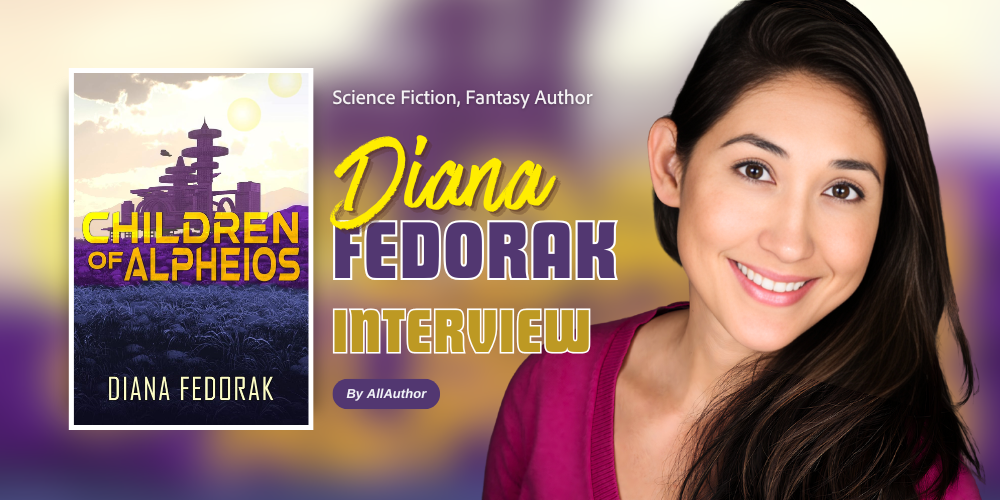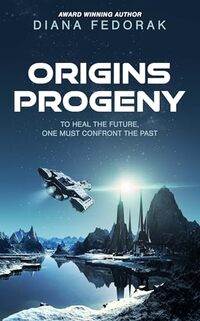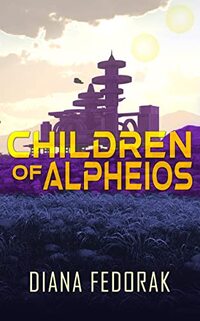Diana Fedorak Interview Published on: 14, Jan 2025
 Growing up in a Pan Am Airways family and living in many different places, how has your global upbringing influenced your speculative fiction writing?
Growing up in a Pan Am Airways family and living in many different places, how has your global upbringing influenced your speculative fiction writing?
I love traveling. The world-building in science fiction & fantasy is a natural fit for me as I like to create far-flung settings and share them with my readers.
What inspired you to transition from a career in the Air Force to becoming a speculative fiction writer?I worked on my Children of Alpheios manuscript for a long time and finally decided to pitch it to agents and editors. I was offered a publishing contract at the tail-end of my Air Force career. I always wanted to become a writer, so I took the opportunity when it presented itself.
Do any specific authors, books, or experiences stand out as pivotal in shaping your writing style?Some of the action scenes are based on experiencing physically and mentally demanding environments. When my protagonist, Alina, is terrain mapping a glacier and other unusual landforms with advanced sensors and satellites, that was based on some geodesy training that I received in the Air Force. In literature, I also enjoyed stories with high stakes across a variety of genres. I remember first reading John Jakes' North and South trilogy as a kid repeatedly. I was struck by the larger-than-life characters, how the author plunged into emotion-laden scenes, and how the Civil War tore apart the families in the series. As a reader, you were confronted with all the personal, social, and political implications of the story.
Your stories are known for their complex characters. How do you develop them, and do you draw from real-life influences?Every character has flaws, and it's a matter of how they manifest. When I create my characters, I usually write some backstory scenes to better understand them. I choose a life-changing moment. Those scenes aren't included in the novel; they're just for me to understand how they react to adversity. I also had a writing instructor who once told me to go a little over-the-top with your characters. It helps make them more memorable.
What challenges and joys do you encounter while building the intricate science fiction and fantasy worlds in your novels?I enjoy sketching my world-building maps by hand. I also enjoy space exploration, so I read through NASA research papers to develop a compelling but habitable world for humans. All worlds, even fantasy settings, have rules, and the challenge is to keep them consistent throughout the story. Otherwise, you confuse readers.
How does your Air Force experience influence the themes or elements in your writing?I'm used to being outnumbered as a female in a male-dominated setting, so I'm comfortable writing male characters. I've also grown up around aviation from a young age, well into my adult life, so I enjoy creating futuristic aircraft and crafting flying scenes.
What drew you to speculative fiction specifically, and how do you see the genre evolving in the future?I fell in love with the fantasy genre, which got me into speculative fiction generally. I think speculative fiction always pushes the boundaries of asking what-if, and exploring how different worlds change us. For the genre, I think readers will want to continue to read about fantastic worlds. I also think while dystopian stories will remain a major niche in speculative fiction, readers will respond to more hope. I think the younger generation, based on what I see in my kids, enjoy serious, but optimistic stories. They also like diverse characters and expect it when they pick up a book, so that will be a trend that continues in the genre.
Alina is a young, determined mother fighting against powerful forces to protect her child. What drew you to write about a character like her, and how did you balance her survival skills with her emotional vulnerabilities as a parent?Parenthood rewires you. Suddenly, it's not just about you anymore. I decided to create a story about a young mother because I wanted to see more of that in stories that I read. I love reading all about the brave maidens, but adding a child into the mix creates a completely new dynamic. It also deepens your character. You don't lose all those skills that you've acquired previously when you become a mother, but there's an added urgency in how you integrate them into your life when you have a child. So I sought to do that with Alina.
The story explores trust, rebellion, and familial bonds. How do these themes shape Alina’s journey, and what message do you hope readers take away about facing authority and standing up for loved ones?Most parents are willing to sacrifice themselves for their children. The dilemma comes when you're asked to submit to authority by living a lie, and knowing that it'll hurt others, even if it negates all the adverse circumstances your child faces. At the end of the day, it comes down to trusting your instincts as a parent.
The bond between Alina and Kiean evolves as they navigate their dangerous circumstances. What makes their relationship compelling?When Alina first meets Kiean, she has a completely wrong impression of him. Later, she finds out that they both care for extraordinary children, and have a shared purpose in that regard. I think Alina realizes that Kiean tends to be a very loyal person for that reason. That becomes pretty important to her as she sets out on her own with her young son.
What advice would you give to aspiring speculative fiction writers who are just starting?Work on your craft consistently and create the best story possible. The business side of being an author requires a very different mentality than the creative aspects of writing, but in the end, no one can take away the story that you created. Be proud of it.
What has been the most challenging aspect of writing and publishing your works?First, finish the book. It took me seven years to write Children of Alpheios. I believed in the story, so I kept hacking away and sought out advice and feedback. Once I finished it, then I had to pivot to being a published author. I wanted to share my work with others.
Can you give us a sneak peek into any upcoming projects or stories you're currently working on?My sequel to Children of Alpheios, Origins Progeny, has a release date of Jan 20, 2025. I was honored that Origins Progeny earned the Publisher's Weekly Booklife Editor's Pick, and I'm excited to continue Alina's journey. I hope to complete the trilogy soon.
What do you hope readers take away from your books, and what kind of legacy do you hope to leave in the speculative fiction genre?I think of how important family matters in our daily lives, and the paradoxical fragility and strengths of those bonds. I want us to ask ourselves how technology shapes those relationships, and how we preserve them.
How has being a part of the AllAuthor community benefited you as a writer? Would you recommend its services to other authors, and why?AllAuthor is a welcoming community. The writers in AllAuthor support one another, which is a must since writing can be a solitary endeavour. I also love their weekly book mockups they send to you. I include them as part of my media kit and recommend it to other authors.
Diana Fedorak is a speculative fiction writer based in Las Vegas, Nevada. Born in Saigon, South Vietnam, and raised in a globe-trotting Pan Am Airways family, she developed a deep appreciation for diverse cultures and storytelling. A former officer in the United States Air Force, Diana crafts high-stakes science fiction and fantasy worlds with intricate characters and compelling narratives.



